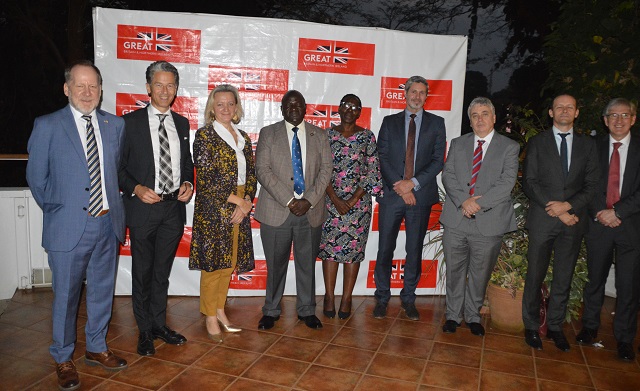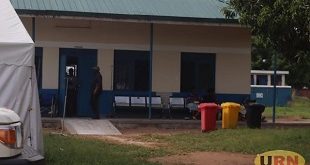
Kampala, Uganda | THE INDEPENDENT | The British High Commission Kampala and TradeMark Africa (TMA) celebrated major milestones on Thursday when they attained in their partnership in reducing barriers to trade for Uganda and her neighbours over the last 13 years.
The partners lauded the impactful interventions that have reduced the cost and time of trading across borders and reiterated the value of strengthened partnerships, building on lessons learnt along trade corridors across Africa. The British High Commission has since 2010 worked through TMA to support One-Stop Border Posts (OSBPs) and improve standards compliance. UK Trade Commissioner for Africa, John Humphrey, British High Commissioner to Uganda, H.E. Ambassador Kate Airey OBE, alongside TradeMark Africa Chief Executive Officer, David Beer, Uganda Minister of Works and Transport, Hon. Gen. Katumba Wamala, Ministry of East African Community Affairs; were joined by representatives from other TMA funding agencies and partners in public and private sectors at the event.
Gen. Katumba Wamala lauded the UK Government and development partners such as the European Union, as steadfast partners in supporting Uganda’s development aspirations. He said; “We are pleased with the support that we have received in various trade facilitation facets such as construction and operationalisation of One Stop Border Posts, road upgrades; development of electronic cargo tracking systems, as well as supporting our farmers and traders in the grain sector to improve standards in commodities such as maize, a key export crop.
These interventions have lowered the cost and time of cross-border trading, reduced the strain on human resources through automation of systems, reduced losses incurred in the transit of goods across the region and improved the incomes and economic status of our people. I am pleased to join you here today to celebrate these milestones and we hope that such partnerships and development support are sustained.” Encouraged by Uganda’s commitment to reducing barriers to trade and improving its business competitiveness,
H.E. Kate Airey said: “Ensuring that Uganda can effectively trade with its neighbours and the rest of the world is crucial for catalysing growth, generating incomes and employment for poverty reduction. The UK and other development partner investments in IT systems for trade such as the integrated border management, regional electronic cargo tracking system for URA and the single electronic window platform have made it quicker and easier to get goods in and out of Uganda.
Support to the Uganda Bureau of Standards has improved the quality of exports and trade infrastructure as Gulu Logistics Hub, which was co-funded by the EU, will better position Uganda as a regional logistics hub serving neighbouring markets in South Sudan and the Democratic Republic of Congo. Uganda’s Prioritising Trade facilitation is commendable, and the focus should now be on ensuring that these investments leverage further improvements and reductions in the time and cost of trade.
” TradeMark Africa CEO, David Beer added: “TradeMark Africa is proud to have set up 15 one-stop border posts (OSBPs) across East Africa. Six of those are in Uganda at Busia, Malaba, Elegu, Mutukula, Mirama Hills, and Goli, and we have also developed Ntoroko Lake Port.
I am delighted that these have led to real results for businesses –the time taken to cross-select OSBPs has declined by an average of 70%. Customs processing at Ntoroko has been reduced from nine hours to less than two. We are very grateful to our development partners, including the UK, which is hosting us here today, for their generous support and collaboration in making this happen. This is the time to strengthen such partnerships and support in light of our growing geographical footprint of facilitating trade across Africa.” Since 2010, TMA has contributed to major reductions in the cost and time taken to trade across borders and along key transport routes in Eastern Africa, with many of the gains felt by Ugandan businesses. For example, the time to transport a container from Mombasa to Kampala has reduced by a third between 2017 and 2021. The time to cross select One Stop Border Posts (OSBPs), made possible with funding from the UK Government, has reduced by an average of 70%. TMA’s interventions in Uganda with support from the UK and other development partners, including Canada, Denmark, European Union, Finland, USAID and the Netherlands encompass trade facilitation areas of customs systems modernisation, trade automation systems, harmonisation of standards and certification, trade policy reviews, capacity building for women in trade, and strengthening prioritised value chains. Support for the development of customs systems for revenue authorities such as Uganda Revenue Authority (URA)’s Asycuda World System, have enhanced the ease of doing business. In Uganda as well as across the region, implementation of electronic single window systems, digital portals, integrated customs management systems, regional electronic cargo and driver tracking, and automated trade exchanges have resulted in at least an 80% reduction in the time and cost of obtaining permits and related trade-related documentation. The UK Government also supported the Authorised Economic Operator (AEO). This allows businesses that comply with custom regulations to benefit from preferential treatments such as fast clearances of their goods through reduced inspection and simplified procedures. The AEO risk management system is scheduled for roll-out this year. Some of the other notable success supported by other development partners include the Uganda Electronic Single Window funded by Denmark. This web-based facility helps in processing import and export documents by streamlining processes for trade related agencies, reducing time and transactional costs. Transaction costs for international traders decreased by a cumulative $26.4 million in 2021 alone. Transaction costs for linked government agencies fell by 45% from $68 to $37.1, with a 79% trade time reduction. During the event, Mr. Beer took the opportunity to highlight salient features of TMA’s new Strategy 3, which covers 2023-2030. This has the goal of helping raise Africa’s share of exports as a percentage of global trade by 4% and the value of exports to the rest of the world from $500 billion to $650 billion. This will directly contribute to thousands of new jobs, increase incomes, and alleviate poverty. “We shall focus on doubling down on the major gains already made to trade flows that emanate from digitising processes and systems, taking advantage of new technologies in more mature markets and applying proven approaches in new areas. We shall also focus on supporting urgent global efforts to decarbonise our world by facilitating more sustainable trade and logistics systems,” Mr. Beer said.
 The Independent Uganda: You get the Truth we Pay the Price
The Independent Uganda: You get the Truth we Pay the Price



